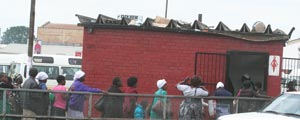
A stream of urine meanders down the pavement from the gate of an enclosed warehouse.
REPORT BY MICHELLE CHIFAMBA
As dusk encroaches, the strong stench of urine, which has stained the roadway, competes for attention with the otherwise sweet aroma from a nearby fast-food joint.
A few metres away a man walking past a shop that has been closed for renovations jumps after almost stepping on a mound of human waste. While many people curse street kids whom they blame for being undisciplined enough as to excrete on street corners, others wonder what has gone wrong with the city’s sanitation as people now relieve themselves anywhere.
Ratepayers blame the city’s lack of free public toilets.
The available public toilets, mostly at Copacabana, Market Square and Charge Office ranks, are an eyesore yet people have no choice but to use them.
“The central business district (CBD) of Harare does not have accessible toilets for the public compelling people to relieve themselves in alleys and secluded spots and in empty plastic bottles that are later thrown all over the city,” said Evans Goche, a vendor in the capital, Harare.
Goche added that most institutions that serve the public in the CBD like banks and supermarkets do not avail their toilets to the public.
- Chamisa under fire over US$120K donation
- Mavhunga puts DeMbare into Chibuku quarterfinals
- Pension funds bet on Cabora Bassa oilfields
- Councils defy govt fire tender directive
Keep Reading
Many ratepayers also accuse people who live in the streets of contributing to the gradual decay in the city as they often relieve themselves at undesignated points.
“Prior to the closure of thefootbridge near Town House, it had been turned into an ablution facility by the street dwellers. Through the fetid smell that emanated from the bridge and human waste on every corner, the place never served its purpose. The major problem can be attributed to the City of Harare which is failing to provide basic services to the public,” James Hotera, a city centre dweller said.
Ratepayers in Harare are appealing to the local authority to reconsider its move of charging for the use of public toilets, citing inflated toilet use charges and their closure during the night which forces people to relieve themselves anywhere.
“Toilets used to be free, but now they come at a price. These toilets must be open to the public even during the night because nature calls at every moment and people end up relieving themselves outside the toilets and in bus terminuses which are have been encroached by the filthy smell,” Lillian Jena, a Harare resident said. The use of public toilets now costs 50 cents along Jason Moyo Avenue, Africa Unity Square, Kwame Nkrumah Avenue Parkade and Julius Nyerere Way Parkade.
In high-density suburbs, the council is failing to renovate or clean the facilities, according to residents.
Toilet cleaners say they only work once every morning, adding that due to failing systems, the toilets are usually messy by midday.
The local authority recently admitted that it was failing to maintain its 125 public toilets around the capital with only two in proper working condition in the CBD.
Some toilets in the suburbs have virtually been closed down due to lack of maintenance.
In the event that the toilets are open, they have no lights and people cannot risk entering them at night, resulting in them relieving themselves in open spaces.
Five years after the disastrous cholera plague in which over 4 000 people died, water woes persist and garbage still goes uncollected, worsening residents’ fears of a possible repeat of the devastating effects of cholera.
Mbare residents have been reported to be defecating in plastics and in buckets as the suburb has gone without running water for the past three weeks.
Every morning for more than a fortnight now residents empty buckets filled with human waste in the Mukuvisi River and other open spaces due to the dried water taps and most toilets in the overcrowded hostel are filled to the brim with human waste.
Members of the public seeking to acquire official documents at the Registrar-General (RG)’s Office at Makombe Building in the capital are also being forced to pay a fee to use the toilets, with many regarding the fee as unjustified, resulting in people relieving themselves behind trees.
On average, the RG’s Office serves 1 000 people per day seeking passports, identity cards and birth certificates.
An estimated $500 is raised every day from toilet usage, assuming that all the people who visit the office pay.
Harare Residents’ Trust director Precious Shumba is on record saying that the local authority has failed in discharging its duties.
“We raised the concern with City of Harare’s Health Department to respond to the cries of citizens on closed public toilets in the central business district, at the Market Square, Rezende Terminus, Charge Office, but nothing has been done.
“The absence of a coherent policy on public health in Harare poses serious challenges for citizens.
“The city should charge reasonable amounts for the pay toilets that promote the public to use toilets,” Shumba said.
Asked to comment on the issue, Harare mayor Muchadeyi Masunda said that was the responsibility of the Town Clerk’s office.
“Your first port of call is the Town Clerk. As you will no doubt appreciate, I deal with policy as opposed to operational issues,” Masunda said.











